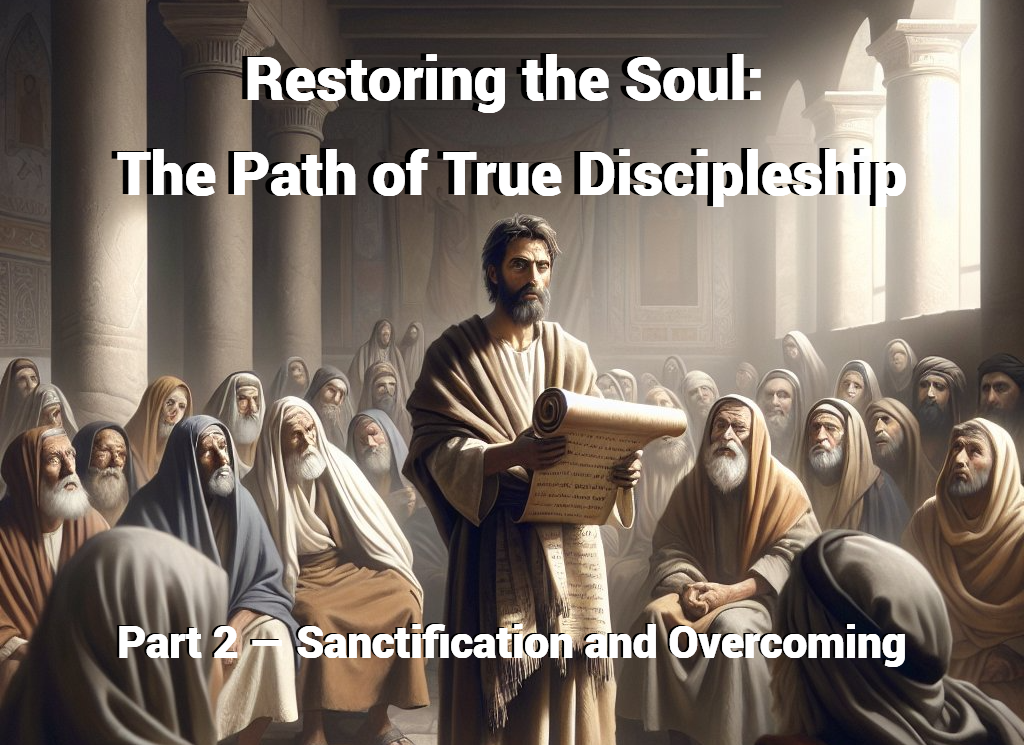Restoring the Soul: The Path of True Discipleship *Part 2

Sanctification and Overcoming
The Work of the Ruach HaKodesh
Sanctification (hitkadshut) is the divine process through which the Ruach HaKodesh (Holy Spirit) transforms the nefesh (soul) of the believer into the likeness of Y’hoshua HaMashiach. Whereas deliverance allows renewal of the ruach and sets the soul free, sanctification refines that freedom into holiness.
“But when the Spirit of Truth comes, He will guide you into all the truth.”
(Yochanan [John] 16:13, CJB)
Only the Ruach HaKodesh knows the depths of the heart—the motives, desires, and secret thoughts. The true counselor of the soul, He gently leads each talmid to rely on Scripture as the sole rule for life and to know the Way of the Spirit Himself.
Sanctification: A Lifelong Process of Transformation
The talmid’s journey is not about reaching perfection overnight but about continual surrender. Sha’ul wrote:
“Keep pursuing shalom with everyone and the holiness without which no one will see the Master.”
(Ivrim [Hebrews] 12:14, CJB)
Sanctification is dynamic—it deepens as we yield more of ourselves to Y’hovah. Through obedience, trials, and testing, the Ruach HaKodesh teaches us to respond to every circumstance according to the Word, not the flesh. Each act of obedience weakens the old self and strengthens the new creation.
Judging Self and Growing in Spiritual Sensitivity
The first step toward overcoming is to judge oneself, not others. We are accountable for our reactions, not for what others do. Y’hoshua reminded us:
“Why do you look at the straw in your brother’s eye but pay no attention to the log in your own?”
(Mattityahu [Matthew] 7:5, CJB)
Through the Ruach HaKodesh, the disciple develops a keen sensitivity to sin—learning to detect impatience, pride, and self-defense before they bloom into action. True maturity begins when one’s first instinct is repentance, not justification.
“If we would examine ourselves, we would not come under judgment.”
(1 Corinthians 11:31, CJB)
Overcoming the Flesh and the Adversary
The talmid is called to be an overcomer (menatze’ach)—one who conquers the old nature through the life of Y’hoshua within.
The first Adam failed to overcome Satan, but Y’hoshua, the second Adam, triumphed. Through Him, we now share in that victory:
“Submit yourselves, then, to Elohim. Resist the devil, and he will flee from you.”
(Ya’akov [James] 4:7, TS2009)
Our struggle is not against the existence of sin itself but against our responses to its temptations—the impulses and emotions that arise from the old nefesh. Each time we say “no” to these and “yes” to the Ruach, we place the enemy underfoot, fulfilling the original mandate of Berĕshith [Genesis] 1:28 —to have dominion.
Thus, overcoming is the art of responding with love, humility, and faith rather than reacting out of fear.
Loving Y’hovah Through Patience and Obedience
Patience (savlanut) is the first fruit of love. The impatient soul exalts self; the patient one surrenders to Y’hovah.
“By your perseverance you will preserve your lives.”
(Luke [Luqas] 21:19, CJB)
Impatience separates us from Y’hovah, from others, and even from ourselves. Holy patience is not weakness but divine strength under control. It is the visible proof of love working through faith.
“Love is patient, love is kind… it is not self-seeking, it is not easily angered.”
(1 Corinthians 13:4-5, CJB)
Every act of patient obedience diminishes the sovereignty of self and enthrones Y’hovah anew in the heart.
Abiding in the Word: The Source of Spiritual Power
The Davar Elohim must not merely visit the talmid’s mind—it must abide (lishkon) within.
“If you remain united with Me, and My words with you, then ask whatever you want, and it will happen for you.”
(Yochanan [John] 15:7, CJB)
To abide means that the Word of Elohim lives, moves, and rules in the heart:
- Stirring conviction and repentance.
- Teaching love, compassion, and righteousness.
- Producing growth and maturity through obedience.
- Empowering faith to overcome temptation.
As the Word abides, it transforms our intellect, emotions, and will to align perfectly with Y’hovah’s nature. The more deeply we dwell in the Word, the more clearly Y’hoshua’s image is formed in us.
The Goal of the Talmid — Conformed to Y’hoshua’s Image
Our Adon took on human flesh that we might be restored to the divine image intended before the fall:
“Let us make man in Our image, according to Our likeness.”
(Berĕshith [Genesis] 1:26, TS2009)
Through His death and resurrection, Y’hoshua translated us from the earthly to the heavenly realm. Sanctification now calls us to identify and rule over the remnants of the fallen nature still within our nefesh (Ephesians 4:22-24). We will never remove that fallen nature, but we must be renewed in the spirit of our mind.
And that we put on the renewed man, which was created according to Elohim, in righteousness and holiness of the truth.
This is a lifelong purification of the intellect, memory, emotions, and will—so that we may love as Y’hovah loves and live as Y’hoshua lives.
“We all, with unveiled face, are being transformed into the same image from glory to glory, even as by Y’hovah the Spirit.”
(2 Corinthians 3:18, TS2009)
Summary and Reflection
- Judge yourself continually, being sensitive to sin and quick to repent.
- Put off the old self daily, responding to life’s trials according to Scripture.
- Walk in forgiveness and reconciliation, allowing Y’hoshua’s obedience to live through you.
- Meditate on the Word daily, allowing the Ruach HaKodesh to purify every inner faculty.
- Live under the Spirit’s influence, becoming a vessel of Y’hovah’s presence on earth.
As we surrender the self and yield to the Ruach HaKodesh, we fulfill our calling—to be filled with the fullness of Elohim and clothed again in His glory as in the beginning.
“To Him who overcomes, I will grant to sit with Me on My throne, as I also overcame and sat down with My Father on His throne.”
(Revelation 3:21, CJB)
By Rabbi Francisco Arbas
📧 franciscoarbas.yisrael@gmail.com
Following His ‘WAY’ — Netzari Mashiach Judaism

Comments ()